How to write a grant proposal: a step-by-step guide
You have a vision for a future research project, and want to share that idea with the world.
To achieve your vision, you need funding from a sponsoring organization, and consequently, you need to write a grant proposal.
Although visualizing your future research through grant writing is exciting, it can also feel daunting. How do you start writing a grant proposal? How do you increase your chances of success in winning a grant?
But, writing a proposal is not as hard as you think. That’s because the grant-writing process can be broken down into actionable steps.
This guide provides a step-by-step approach to grant-writing that includes researching the application process, planning your research project, and writing the proposal. It is written from extensive research into grant-writing, and our experiences of writing proposals as graduate students, postdocs, and faculty in the sciences.
What is a grant proposal?
A grant proposal is a document or collection of documents that outlines the strategy for a future research project and is submitted to a sponsoring organization with the specific goal of getting funding to support the research. For example, grants for large projects with multiple researchers may be used to purchase lab equipment, provide stipends for graduate and undergraduate researchers, fund conference travel, and support the salaries of research personnel.
As a graduate student, you might apply for a PhD scholarship, or postdoctoral fellowship, and may need to write a proposal as part of your application. As a faculty member of a university, you may need to provide evidence of having submitted grant applications to obtain a permanent position or promotion.
Why should you write a grant proposal?
Reasons for writing a grant proposal include:
- To obtain financial support for graduate or postdoctoral studies;
- To travel to a field site, or to travel to meet with collaborators;
- To conduct preliminary research for a larger project;
- To obtain a visiting position at another institution;
- To support undergraduate student research as a faculty member;
- To obtain funding for a large collaborative project, which may be needed to retain employment at a university.
The experience of writing a proposal can be helpful, even if you fail to obtain funding. Benefits include:
- Improvement of your research and writing skills
- Enhancement of academic employment prospects, as fellowships and grants awarded and applied for can be listed on your academic CV
- Raising your profile as an independent academic researcher because writing proposals can help you become known to leaders in your field.
Format of a grant proposal
All sponsoring agencies have specific requirements for the format of a grant proposal. For example, for a PhD scholarship or postdoctoral fellowship, you may be required to include a description of your project, an academic CV, and letters of support from mentors or collaborators.
For a large research project with many collaborators, the collection of documents that need to be submitted may be extensive. Examples of documents that might be required include a cover letter, a project summary, a detailed description of the proposed research, a budget, a document justifying the budget, and the CVs of all research personnel.
Before writing your proposal, be sure to note the list of required documents.
How to write a grant proposal
Writing a grant proposal can be broken down into three major activities: researching the project (reading background materials, note-taking, preliminary work, etc.), writing the proposal (creating an outline, writing the first draft, revisions, formatting), and administrative tasks for the project (emails, phone calls, meetings, writing CVs and other supporting documents, etc.).
Below, we provide a step-by-step guide to writing a grant proposal:
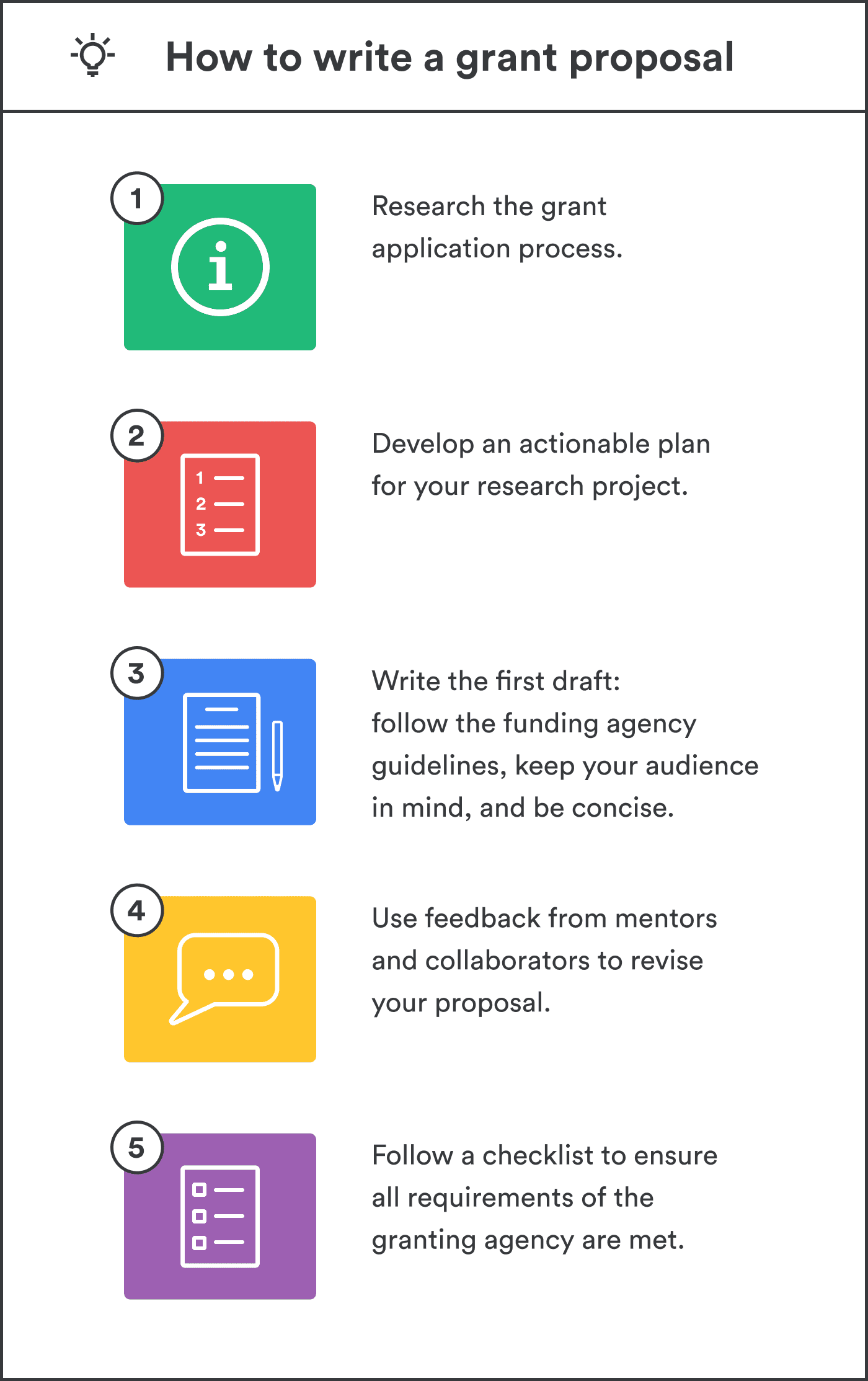
- Decide what funding opportunity to apply for, and research the grant application process
- Plan and research your project
- Write the first draft of your grant proposal
- Get feedback, and revise your grant proposal accordingly
- Prepare to submit your grant proposal
Step 1: Decide what funding opportunity to apply for, and research the grant application process
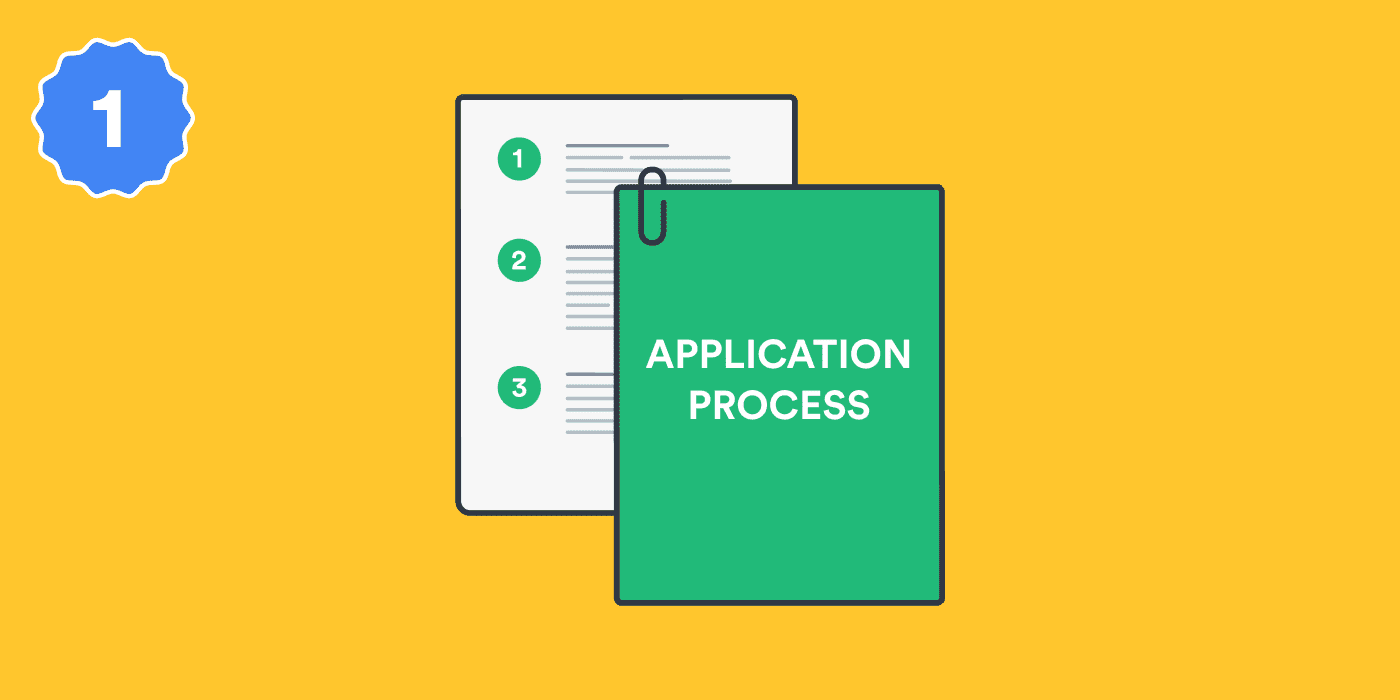
- Start early. Begin by searching for funding opportunities and determining requirements. Some sponsoring organizations prioritize fundamental research, whereas others support applied research. Be sure your project fits the mission statement of the granting organization. Look at recently funded proposals and/or sample proposals on the agency website, if available. The Research or Grants Office at your institution may be able to help with finding grant opportunities.
- Make a spreadsheet of grant opportunities, with a link to the call for proposals page, the mission and aims of the agency, and the deadline for submission. Use the information that you have compiled in your spreadsheet to decide what to apply for.
- Once you have made your decision, carefully read the instructions in the call for proposals. Make a list of all the documents you need to apply, and note the formatting requirements and page limits. Know exactly what the funding agency requires of submitted proposals.
- Reach out to support staff at your university (for example, at your Research or Grants Office), potential mentors, or collaborators. For example, internal deadlines for submitting external grants are often earlier than the submission date. Make sure to learn about your institution’s internal processes, and obtain contact information for the relevant support staff.
- Applying for a grant or fellowship involves administrative work. Start preparing your CV and begin collecting supporting documents from collaborators, such as letters of support. If the application to the sponsoring agency is electronic, schedule time to set up an account, log into the system, download necessary forms and paperwork, etc. Don’t leave all of the administrative tasks until the end.
- Map out the important deadlines on your calendar. These might include video calls with collaborators, a date for the first draft to be complete, internal submission deadlines, and the funding agency deadline.
- Schedule time on your calendar for research, writing, and administrative tasks associated with the project. It’s wise to group similar tasks and block out time for them (a process known as ”time batching”). Break down bigger tasks into smaller ones.
Step 2: Plan and research your project
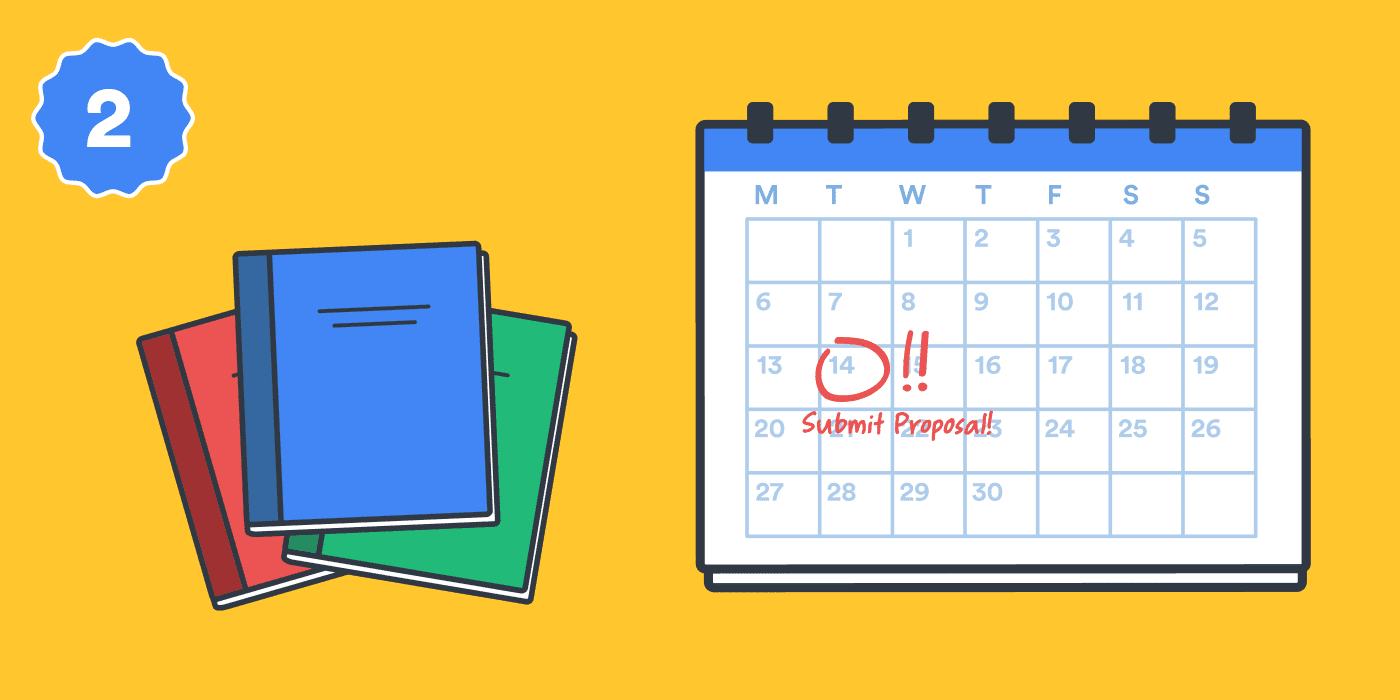
Now that you know what you are applying for, you can think about matching your proposed research to the aims of the agency. The work you propose needs to be innovative, specific, realizable, timely, and worthy of the sponsoring organization’s attention.
Preliminary research for your grant proposal
- Develop an awareness of the important problems and open questions in your field. Attend conferences and seminar talks and follow all of your field’s major journals.
- Read widely and deeply. Journal review articles are a helpful place to start. Reading papers from related but different subfields can generate ideas. Taking detailed notes as you read will help you recall the important findings and connect disparate concepts.
- Writing a grant proposal is a creative and imaginative endeavor. Write down all of your ideas. Freewriting is a practice where you write down all that comes to mind without filtering your ideas for feasibility or stopping to edit mistakes. By continuously writing your thoughts without judgment, the practice can help overcome procrastination and writer’s block. It can also unleash your creativity, and generate new ideas and associations. Mind mapping is another technique for brainstorming and generating connections between ideas.
- Establish a regular writing practice. Schedule time just for writing, and turn off all distractions during your focused work time. You can use your writing process to refine your thoughts and ideas.
- Use a reference manager to build a library of sources for your project. You can use a reference management tool to collect papers, store and organize references, and highlight and annotate PDFs. Establish a system for organizing your ideas by tagging papers with labels and using folders to store similar references.
Organize your library of sources for your grant proposal with a reference manager like Paperpile.
Questions to ask yourself as you plan your grant proposal
To facilitate intelligent thinking and shape the overall direction of your project, try answering the following questions:
- What are the questions that the project will address? Am I excited and curious about their answers?
- Why are these questions important?
- What are the goals of the project? Are they SMART (Specific, Measurable, Actionable, Relevant, and Timely)?
- What is novel about my project? What is the gap in current knowledge?
- What methods will I use, and how feasible is my approach?
- Can the work be done over the proposed period, and with the budget I am requesting?
- Do I have relevant experience? For example, have I completed similar work funded by previous grants or written papers on my proposed topic?
- What pilot research or prior work can I use, or do I need to complete preliminary research before writing the proposal?
- Will the outcomes of my work be consequential? Will the granting agency be interested in the results?
- What solutions to open problems in my field will this project offer? Are there broader implications of my work?
- Who will the project involve? Do I need mentors, collaborators, or students to contribute to the proposed work? If so, what roles will they have?
- Who will read the proposal? For example, experts in the field will require details of methods, statistical analyses, etc., whereas non-experts may be more concerned with the big picture.
- What do I want the reviewers to feel, and take away from reading my proposal?
- What weaknesses does my proposed research have? What objections might reviewers raise, and how can I address them?
- Can I visualize a timeline for my project?
Create an actionable plan for your research project using the answers to these questions.
Developing your grant proposal
- Now is the time to collect preliminary data, conduct experiments, or do a preliminary study to motivate your research, and demonstrate that your proposed project is realistic.
- Use your plan to write a detailed outline of the proposal. An outline helps you to write a proposal that has a logical format and ensures your thought process is rational. It also provides a structure to support your writing.
- Follow the granting agency’s guidelines for titles, sections, and subsections to inform your outline.
At this stage, you should have identified the aims of your project, what questions your work will answer, and how they are relevant to the sponsoring agency’s call for proposals. Be able to explain the originality, importance, and achievability of your proposed work.
Step 3: Write the first draft of your grant proposal
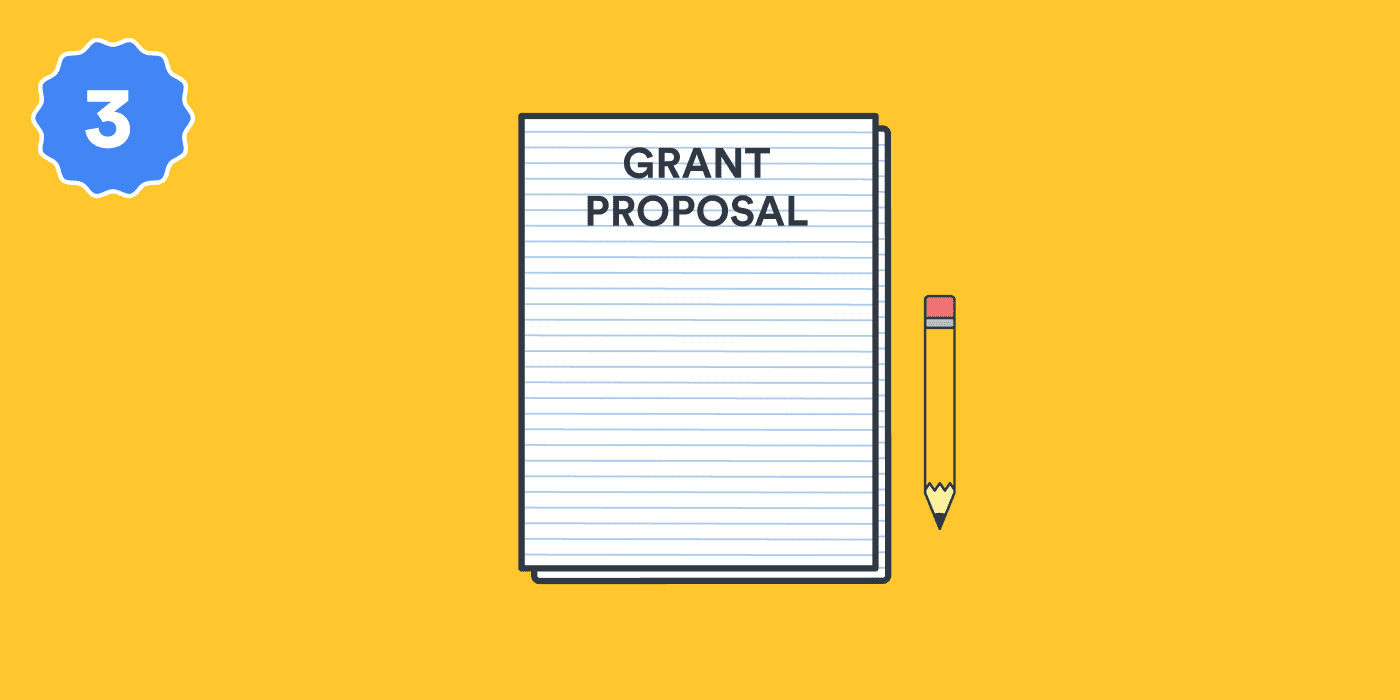
Now that you have done your research, you are ready to begin writing your proposal and start filling in the details of your outline. Build on the writing routine you have already started. Here are some tips:
- Follow the guidelines of the funding organization.
- Keep the proposal reviewers in mind as you write. Your audience may be a combination of specialists in your field and non-specialists. Make sure to address the novelty of your work, its significance, and its feasibility.
- Write clearly, concisely, and avoid repetition. Use topic sentences for each paragraph to emphasize key ideas. Concluding sentences of each paragraph should develop, clarify, or summarize the support for the declaration in the topic sentence. To make your writing engaging, vary sentence length.
- Avoid jargon, where possible. Follow sentences that have complex technical information with a summary in plain language.
- Don’t review all information on the topic, but include enough background information to convince reviewers that you are knowledgeable about it. Include preliminary data to convince reviewers you can do the work. Cite all relevant work.
- Make sure not to be overly ambitious. Don’t propose to do so much that reviewers doubt your ability to complete the project. Rather, a project with clear, narrowly-defined goals may prove favorable to reviewers.
- Accurately represent the scope of your project; don’t exaggerate its impacts. Avoid bias. Be forthright about the limitations of your research.
- Ensure to address potential objections and concerns that reviewers may have with the proposed work. Show that you have carefully thought about the project by explaining your rationale.
- Use diagrams and figures effectively. Make sure they are not too small or contain too much information or details.
After writing your first draft, read it carefully to gain an overview of the logic of your argument. Answer the following questions:
- Is your proposal concise, explicit, and specific?
- Have you included all necessary assumptions, data points, and evidence in your proposal?
- Do you need to make structural changes like moving or deleting paragraphs or including additional tables or figures to strengthen your rationale?
- Have you answered most of the questions posed in Step 2 above in your proposal?
Grant proposal formatting tips
- Follow the length requirements in the proposal guidelines. Don't feel compelled to include everything you know!
- Use formatting techniques to make your proposal easy on the eye. Follow rules for font, layout, margins, citation styles, etc. Avoid walls of text. Use bolding and italicizing to emphasize points.
- Comply with all style, organization, and reference list guidelines to make it easy to reviewers to quickly understand your argument. If you don’t, it’s at best a chore for the reviewers to read because it doesn’t make the most convincing case for you and your work. At worst, your proposal may be rejected by the sponsoring agency without review.
- Using a reference management tool like Paperpile will make citation creation and formatting in your grant proposal quick, easy and accurate.
You can use a reference manager like Paperpile to format the reference list for your grant proposal.
Step 4: Get feedback, and revise your grant proposal accordingly
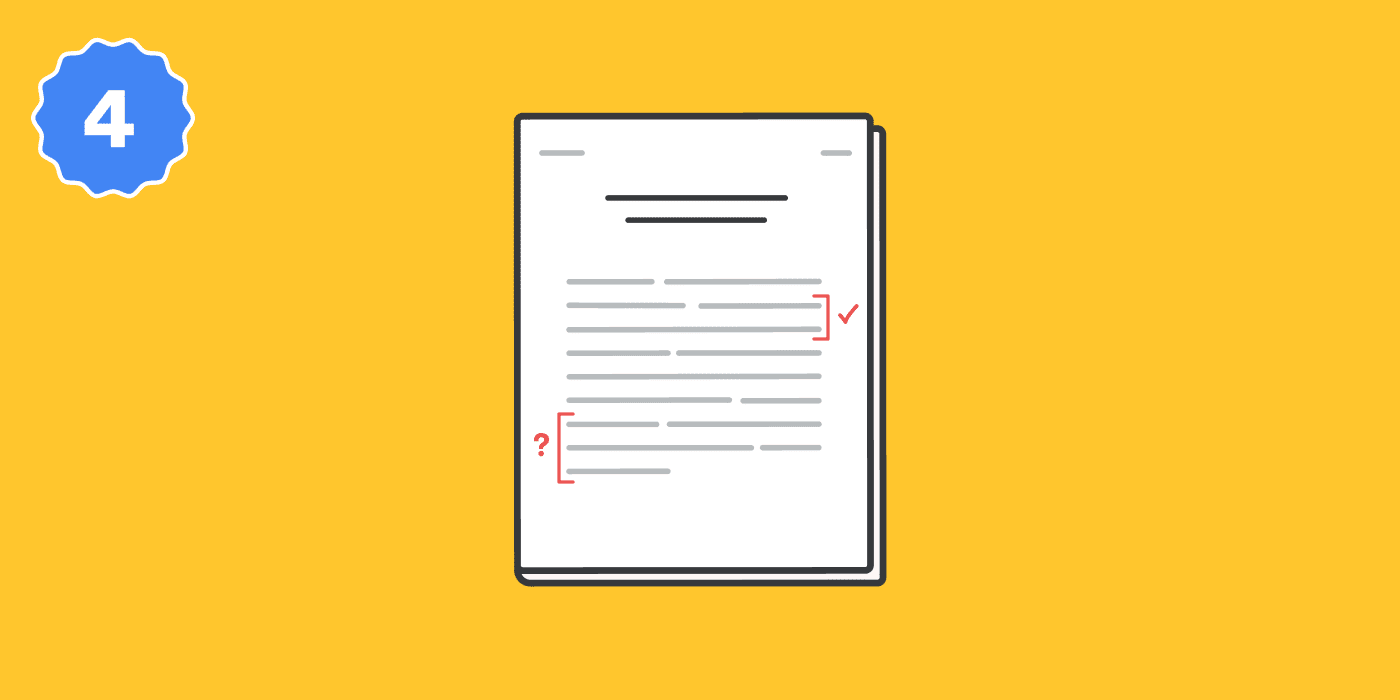
Now take time away from your proposal, for at least a week or more. Ask trusted mentors or collaborators to read it, and give them adequate time to give critical feedback.
- At this stage, you can return to any remaining administrative work while you wait for feedback on the proposal, such as finalizing your budget or updating your CV.
- Revise the proposal based on the feedback you receive.
- Don’t be discouraged by critiques of your proposal or take them personally. Receiving and incorporating feedback with humility is essential to grow as a grant writer.
Step 5: Prepare to submit your grant proposal
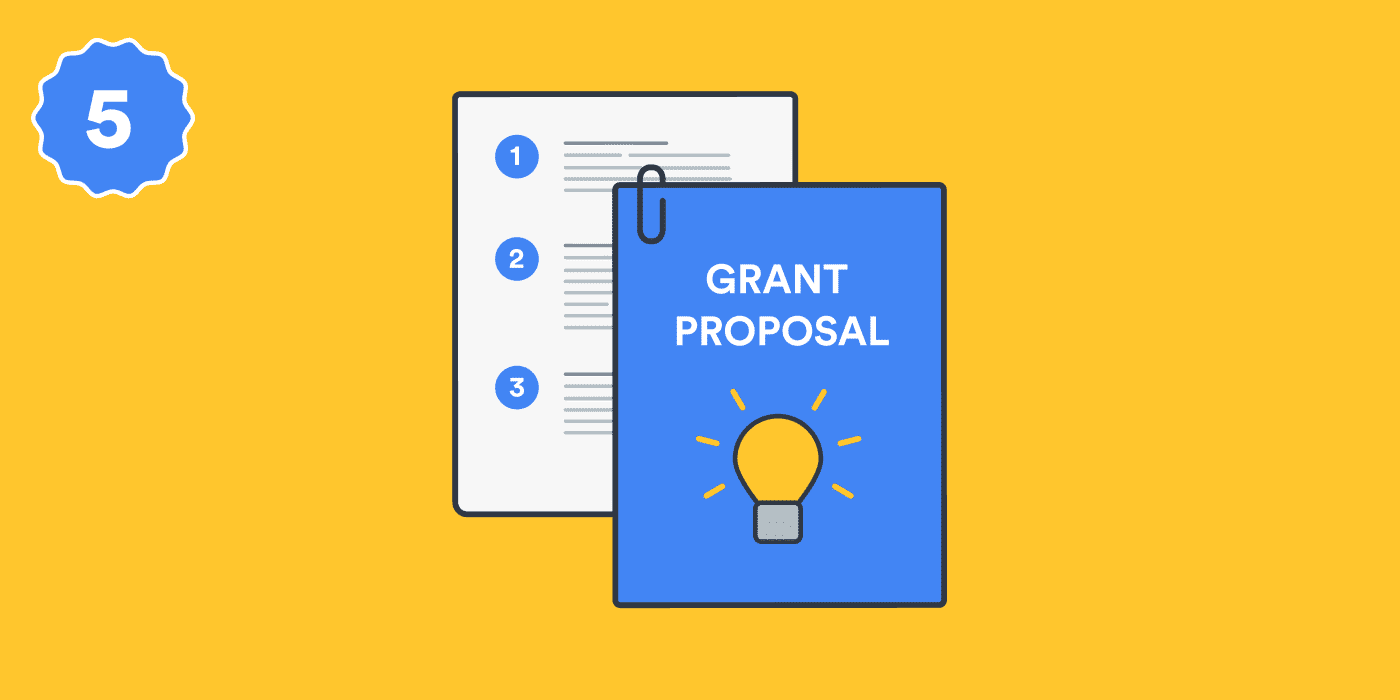
Now you are almost ready to submit. This is exciting! At this stage, you need to block out time to complete all final checks.
- Allow time for proofreading and final editing. Spelling and grammar mistakes can raise questions regarding the rigor of your research and leave a poor impression of your proposal on reviewers. Ensure that a unified narrative is threaded throughout all documents in the application.
- Finalize your documents by following a checklist. Make sure all documents are in place in the application, and all formatting and organizational requirements are met.
- Follow all internal and external procedures. Have login information for granting agency and institution portals to hand. Double-check any internal procedures required by your institution (applications for large grants often have a deadline for sign-off by your institution’s Research or Grants Office that is earlier than the funding agency deadline).
- To avoid technical issues with electronic portals, submit your proposal as early as you can.
- Breathe a sigh of relief when all the work is done, and take time to celebrate submitting the proposal! This is already a big achievement.
Now you wait! If the news is positive, congratulations!
But if your proposal is rejected, take heart in the fact that the process of writing it has been useful for your professional growth, and for developing your ideas.
Bear in mind that because grants are often highly competitive, acceptance rates for proposals are usually low. It is very typical to not be successful on the first try and to have to apply for the same grant multiple times.
Here are some tips to increase your chances of success on your next attempt:
- Remember that grant writing is often not a linear process. It is typical to have to use the reviews to revise and resubmit your proposal.
- Carefully read the reviews and incorporate the feedback into the next iteration of your proposal. Use the feedback to improve and refine your ideas.
- Don’t ignore the comments received from reviewers—be sure to address their objections in your next proposal. You may decide to include a section with a response to the reviewers, to show the sponsoring agency that you have carefully considered their comments.
- If you did not receive reviewer feedback, you can usually request it.
Final thoughts
You learn about your field and grow intellectually from writing a proposal. The process of researching, writing, and revising a proposal refines your ideas and may create new directions for future projects. Professional opportunities exist for researchers who are willing to persevere with submitting grant applications.
Other useful sources for writing grant proposals
Frequently Asked Questions about writing grant proposals
❓ What should a grant proposal include?
A grant proposal should include all the documents listed as required by the sponsoring organization. Check what documents the granting agency needs before you start writing the proposal.
❓ How long should a grant proposal be?
Granting agencies have strict formatting requirements, with strict page limits and/or word counts. Check the maximum length required by the granting agency. It is okay for the proposal to be shorter than the maximum length.
❓ How many hours does it take to write a grant proposal?
Expect to spend many hours, even weeks, researching and writing a grant proposal. Consequently, it is important to start early! Block time in your calendar for research, writing, and administration tasks. Allow extra time at the end of the grant-writing process to edit, proofread, and meet presentation guidelines.
❓ What is the most important part of a grant proposal?
The most important part of a grant proposal is the description of the project. Make sure that the research you propose in your project narrative is new, important, and viable, and that it meets the goals of the sponsoring organization.
❓ What format does a typical grant proposal take?
A grant proposal typically consists of a set of documents. Funding agencies have specific requirements for the formatting and organization of each document. Make sure to follow their guidelines exactly.







